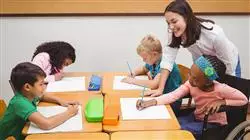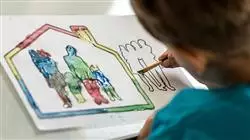University certificate
The world's largest faculty of psychology”
Description
Update your knowledge about social exclusion with a modern vision and a syllabus that covers the student, the classroom, the center, the law and the educational system"

Each child has different characteristics, interests and abilities. Educational systems and programs must take this diversity into account. Therefore, the centers have the obligation to respond to the different educational needs in school and out-of-school pedagogical contexts.
In this sense, this postgraduate diploma aims to provide an updated vision of inclusive education. Understanding the risk that certain situations pose for students, and providing the most appropriate tools and techniques in each case.
To do this, we will delve into students with special needs and high abilities, as well as those who are suffering from external circumstances. Defining, for each case, the aspects that impede the follow-up of the sessions and the most appropriate procedures. In addition, some very useful concepts and techniques such as cooperative learning or coeducation will be explained. Always, with the intention that psychologists update their knowledge in the field of social exclusion.
These contents will be taught in a 100% online modality, without timetables and with the syllabus available in its entirety from the first day. In this way, organization and personal and work conciliation are favored, and, consequently, learning.
This program will allow you to work according to the most innovative techniques of guidance in the educational field"
This postgraduate diploma in Detection of Social Exclusion in the Educational Environment for Psychologists contains the most complete and up-to-date scientific program on the market. The most important features include:
- The development of case studies presented by experts in the detection of social exclusion in the educational field
- Graphic, schematic, and practical contents with which they are created, provide scientific and practical information on the disciplines that are essential for professional practice
- Practical exercises where the self-assessment process can be carried out to improve learning
- Its special emphasis on innovative methodologies
- Theoretical lessons, questions to the expert, debate forums on controversial topics, and individual reflection assignments
- Content that is accessible from any fixed or portable device with an Internet connection
Students coming from shelters have socialized very differently from their peers. This program offers you the most innovative techniques to deal with their situation"
The program’s teaching staff includes professionals from the sector who contribute their work experience to this educational program, as well as renowned specialists from leading societies and prestigious universities.
Its multimedia content, developed with the latest educational technology, will provide the professionals with situated and contextual learning, i.e., a simulated environment that will provide an immersive education programmed to learn in real situations.
The design of this program focuses on Problem-Based Learning, by means of which the professionals must try to solve the different professional practice situations that are presented throughout the academic course. For this purpose, the students will be assisted by an innovative interactive video system created by renowned experts.
Enroll and update yourself with the latest legislation so that your intervention in cases of social exclusion is always in accordance with current regulations"

By taking this program you will delve into the particularities of foster care for minors. Both from the parental perspective and from the children's perspective"
Objectives
Graduates in this postgraduate diploma will learn the most current techniques for detecting and acting in situations of social exclusion in educational environments. The possible reasons for conflict will be studied in depth, different techniques will be provided to identify them and the most appropriate ways to deal with them will be discussed. Always based on current legislation and the most recent research in the field of social exclusion.

Throughout the program you will learn the most innovative and effective intervention methodologies"
General Objectives
- Enable the student to teach in situations of risk of exclusion
- Define the main characteristics of inclusive education
- Manage techniques and strategies for the intervention with the diversity of students, as well as with the educational community: families and environment
- Analyze the role of teachers and families in the context of inclusive education
- Interpret all the elements and aspects concerning teacher preparation in the inclusive school
- Develop in the student ability to develop their own methodology and work system
- Internalize the typology of students who are at risk and socially excluded, and how the educational system should respond to them
- Describe the functioning of the child and youth protection system
- Study the different types of protection measures and their treatment in the school environment
- Analyze situations of child abuse and the protocols for action by the psychology professional
- Identify the stages of development from birth to adolescence; achieving that students have their own judgment to establish the effects that cognitive, communicative, motor and emotional processes have on child development
- Detect different risk factors that may alter development throughout the life cycle
- Describe the general circumstances of the students under guardianship and how these may affect their educational environment
- Learn how to respond to students under guardianship and their families in the school environment
- Apply mediation as a pedagogical tool for conflict resolution and harmony the educational community
Specific Objectives
Module 1
- Describe the implications of the educational system for the inclusion of different traditionally excluded social groups
- Value the importance of the inclusive school for the attention to student diversity
- Explain, according to current legislation, who are the students with special educational needs (SEN)
- Recognize the main SEN that can be presented by the Children with special education Needs
- Delve into the HIP and the models of attention to their SEN
- Establish the relationship between inclusion and multiculturalism
- Explain the importance of cooperative learning for inclusion
- Promote the value of coeducation for the reduction of school exclusion
- Identify the most influential aspects in the social climate of the classroom
Module 2
- Analyze the legal framework of the child protection system
- Define the basic concepts of protection
- Identify the various types of protection measures
- Explain the operation of residential centers and their coordination with the school
- Develop skills to intervene in the school environment with children living in foster families or adopted children
Module 3
- Define the specific characteristics of foster and adopted children
- Acquire knowledge about the specific needs of children in foster and adoptive families
- Define the different agents involved in the guardianship procedure and in the decision making process
- Describe the different protection measures
- Acquire tools to deal with situations derived from the condition of being under guardianship
- Internalize and make essential the need for coordination between the different social agents surrounding the child under guardianship or the girl under guardianship
- Provide real alternatives in the field of social and labor insertion

TECH shares the same goal as you do: to do everything possible to ensure that students in the classroom have equal opportunities"
Postgraduate Diploma in Detection of Social Exclusion in the Educational Environment for Psychologists
Social exclusion is a challenge that affects numerous individuals and communities in our society today. It is essential to have professionals trained to detect and address this problem, especially in the educational setting. If you are a psychologist and wish to acquire the necessary skills to identify and intervene in cases of social exclusion in educational settings, the Postgraduate Diploma in Detection of Social Exclusion in the Educational Environment of TECH Global University is the perfect choice for you.
Start strengthening your professional profile
Our Postgraduate Diploma in Detection of Social Exclusion in the Educational Environment for Psychologists is taught in online mode, which gives you the flexibility to study from anywhere and adapt your learning to your schedule and responsibilities. At TECH Global University, we are committed to providing you with a quality education, supported by interactive resources and cutting-edge technological tools. In this program, you will have a team of professional experts in psychology and social exclusion that will guide you in the analysis of the factors that contribute to exclusion in the educational environment. You will learn to identify early signs of social exclusion, such as bullying, poor academic performance, lack of motivation and lack of participation, among others. In addition, you will develop skills to design and implement intervention strategies that promote the inclusion and well-being of all students. In the Postgraduate Diploma in Detection of Social Exclusion in the Educational Environment of TECH Global University, you will also explore the importance of collaboration with other professionals and educational agents to comprehensively address this problem. You will acquire knowledge about inclusive educational policies, psychosocial support programs and mediation and conflict resolution techniques. Become an agent of change in the educational field and contribute to the creation of inclusive and respectful environments. Earn your Postgraduate Diploma in Detection of Social Exclusion in the Educational Environment for Psychologists at TECH Global University and make a difference in the lives of students.







